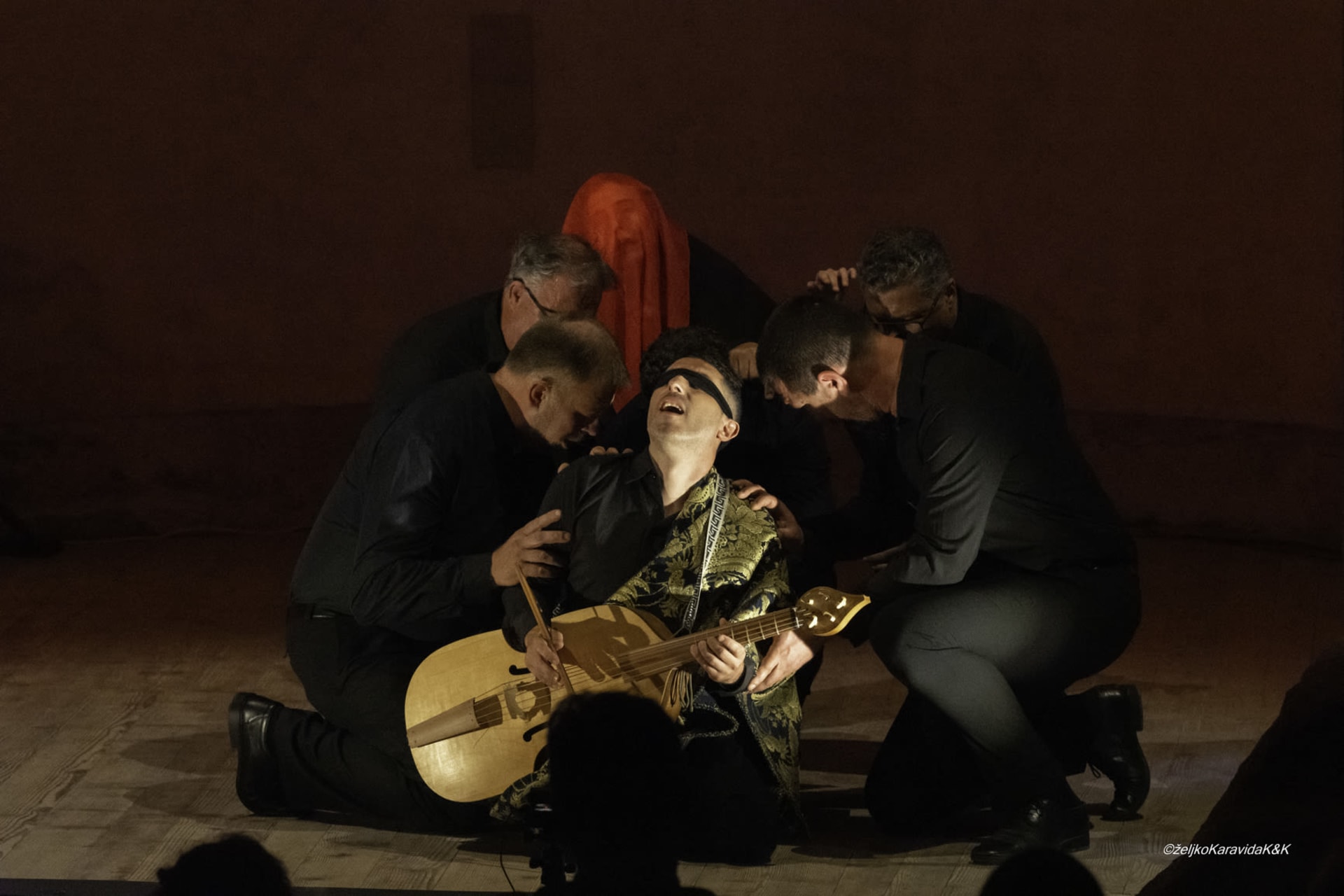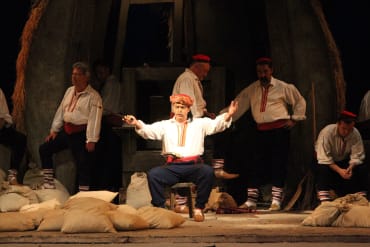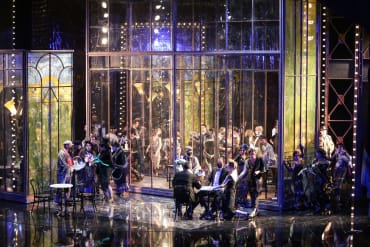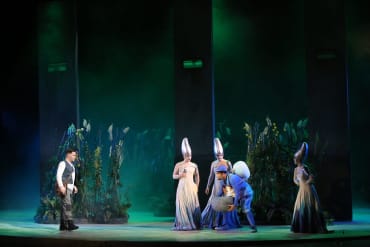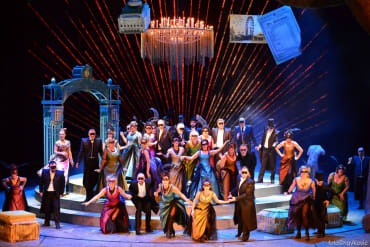Hecuba
After text by Marin Držić (1559) and Lodovico Dolce (1543)
Ensemble Dialogos and Katarina Livljanić
Cast:
Katarina Livljanić, Hecuba
Francisco Mañalich, Ghost of Polydorus, Polyxena, Polymestor
Tonko Podrug, Odysseus
Milivoj Rilov, Agamemnon
Srećko Damjanović, servant
Chorus:
Ensemble Dialogos
Joško Ćaleta, voice and artistic leader
Srećko Damjanović, voice
Nikola Damjanović, voice
Tonko Podrug, voice
Milivoj Rilov, voice
Instruments:
Norbert Rodenkirchen, flutes, dvojnice
Albrecht Maurer, viella, lijerica
Francisco Mañalich, viola
Stage director, set and costume design, subtitles: Sanda Hržić
Music leader, libretto: Katarina Livljanić
Music reconstruction: Katarina Livljanić, Francisco Mañalich, Joško Ćaleta
Instrumental music reconstruction: Norbert Rodenkirchen, Albrecht Maurer
Music-stage performance with subtitles in the Croatian language
Translation: Vojo Šindolić and Katarina Livljanić
Lighting and technical support: Srećko Damjanović
Have you ever been scared of your own thoughts; have you ever been so deeply hurt that, out of rage and pain, the only relief for you would be revenge? If you are not yet acquainted with Hecuba, the Queen of Troy, it is time that you get to know her.
The Story
The story of Hecuba is encompassed by the sea and wind. The war has ended, and Troy is destroyed. The tired Greek soldiers sit on the burnt no man’s land and wish to go home, but the wind stops, and the ships cannot set sail. At that moment of futile dead calm sea, when everything is stale and still, it is necessary to beg Gods to bestir something and to sacrifice something that is hard to give up. The spirit of the dead Greek hero Achilles arises and seeks the greatest treasure, Polyxena, daughter of Hecuba in order to release the winds for the Greeks to set sail.
The story about Hecuba has been initiated by insomnia in which prophetic dreams blaze. In her dream Hecuba sees the fall of Troy and the death of Polyxena, not knowing that one more horror is awaiting her: her youngest son Polydorus, whom his father committed with many treasures to the care of Polymestor is put to death out of greed for the gold and his body is thrown into the sea.
The death of Polyxena is very hard; it comes from the enemy, from destiny, from the signs of Gods. She is the necessary collateral to appease the wind needed to set sail from the post-war quagmire. Still, the death of Polydorus is more painful. It is a senseless death; it is the end of trust in the closest friend; it is a stolen life because of the lowest human instincts.
Hecuba, from a gracious queen turns into a berserk demon for whom the only way out is revenge. She goes from one to another warrior seeking an explanation or help. Odysseus is already tired from everything, but he is also duplicitous and cunning, Agamemnon is a powerful macho ready for making pacts and Polymestor is a cynic liar and opportunist. With Agamemnon's help Hecuba will lure Polymestor into the camp where the Troyan women will have their revenge – they will pluck his eyes out and kill the children.
The story about Hecuba finds peace in the light that overflows the darkness. Hecuba experiences the catharsis of revenge and Polymestor, through the darkness of his blindness, starts seeing the future and begins telling fortunes.
Project of Dialogos
Dialogos draws inspiration for this music-stage performance of Hecuba from two Renaissance sources. In the 16th century, the Venetian polymath Lodovico Dolce (1508-1568) translated Erasmus's Latin version (printed in 1506) of Euripides's antic Hecuba (480-406 B.C.) into Italian. Dolce's elegant verse story about Hecuba influenced Marin Držić (1508-1567) in Dubrovnik to rearrange Dolce's text and write his own verse drama in the Croatian language. It was performed in Dubrovnik in 1559, after it was banned twice because the local government considered it much too turbulent. Dolce and Držić, two Mediterranean twins, born and died around the same age, today rest in two Venetian churches that are separated by a few steps and a narrow channel or two of the stale Adriatic Sea without any wind. Their two republics, Dubrovnik and Serenissima stood like two forts around that same Adriatic Sea, at the time when Dolce and Držić wrote their Hecubas. Have they ever met?
Music
The creative project of ensemble Dialogos combines Dolce's and Držić's version of the story: the Greeks and the Troyans sing and confront each other in old Italian and Croatian dialects in this part of solo singers, instrumentalists and a small group of traditional singers from Dalmatia who comment the plot like chorus…
The music in our Hecuba emerged in the lab of Dialogos that through improvisation techniques drew on Dubrovnik and Venetian sources of the 16th century as well as on the traditional music of the Dubrovnik region preserved until today.
There are plenty of sources: in Venetian salons, Ridottos and Accademias, the gathering places of humanists, music was played by diverse ensembles - rearrangement of madrigals for voice and instruments and improvised singing poetry. Cantori al liuto, such as Ippolito Tromboncino, who is mentioned by Lodovico Dolce himself, sang accompanied by a lute or some other instrument and the sources also mention burlesques of Schiavoni who sang along a viola da braccio in a distorted dialect. For Dolce's tragedy Le Troiane, the unpreserved music parts were composed at that time by Claudio Merulo, the organ player of St. Marco. Cornelio Frangipane, author of Tragedie (1574) mentions Merulo's music in his work, present not only in the intermezzos and choruses between the dramatic scenes, but also in the text declamations of various roles! Unfortunately, this music has been lost as well, but the preserved parts of sung poetry such as strambotto, giustiniano, gregeschi exist in numerous Venetian publications of the 16th century and are evidence of the porous boundaries between a highly sophisticated tradition of Renaissance polyphony and its adaptations into the world of poets-singers in humanist salons and theatre performances.
On the other side of the Adriatic, in the Renaissance Dubrovnik, music was present in various contexts: Accademia dei Concordi gathered together Dubrovnik humanists and the French composer Lambert Courtois with an interesting polyphonic opus who was active in the music life of the town... In 1533 the Croatian adaptation of Poliziano's Orpheus was staged with numerous singing instructions and in 1548, Držić's comedy Tirena on the cover page has a note on Moresca, a warrior dance that has survived on the island of Korčula until today. References of shepherd's dances and Moresca represent a contrast and some kind of a “creative clash” of folk Slavic culture with the culture under Venetian influence.
It is this encounter of diversity that led to the creation of music for our Hecuba: the experimenting with excerpts of melodies of Ippolito Tromboncino, Claudio Merulo, Lambert Courtois served as a basis for the development of vocal lines on the brink of improvisation with instrumental accompaniment, sometimes on the edge of speech and singing. On the other side, folk singing of the Dubrovnik region and the usage of instrument lijerica preserved until today in traditional music, guided us in our creation and dramatic development of this specific “creative clash” of the two neighbouring, yet different worlds.
The result is a music performance in which the timeless power of the Greek myth meets with the subtlety of Venetian Renaissance and the coarse strength of Dalmatia on the threshold of the Ottoman Empire. Just as Dolce, Merulo, Držić... were children of their time, and their works were not reconstructions of antic tragedies but Renaissance art, so are we, children of our time, and our "two-headed" Venetian-Dubrovnik Hecuba is a new work inspired by the past.
In today's world that prefers black-white divisions between the good and the evil, Hecuba is a story about the good that can be evil and about the evil that can take pity. Hecuba is a story about the human soul in its entire depth and impenetrability, about the darkness that can be light and about the blindness that can become sight.
Let the good wind blow and Hecuba will set off towards you.
Katarina Livljanić
